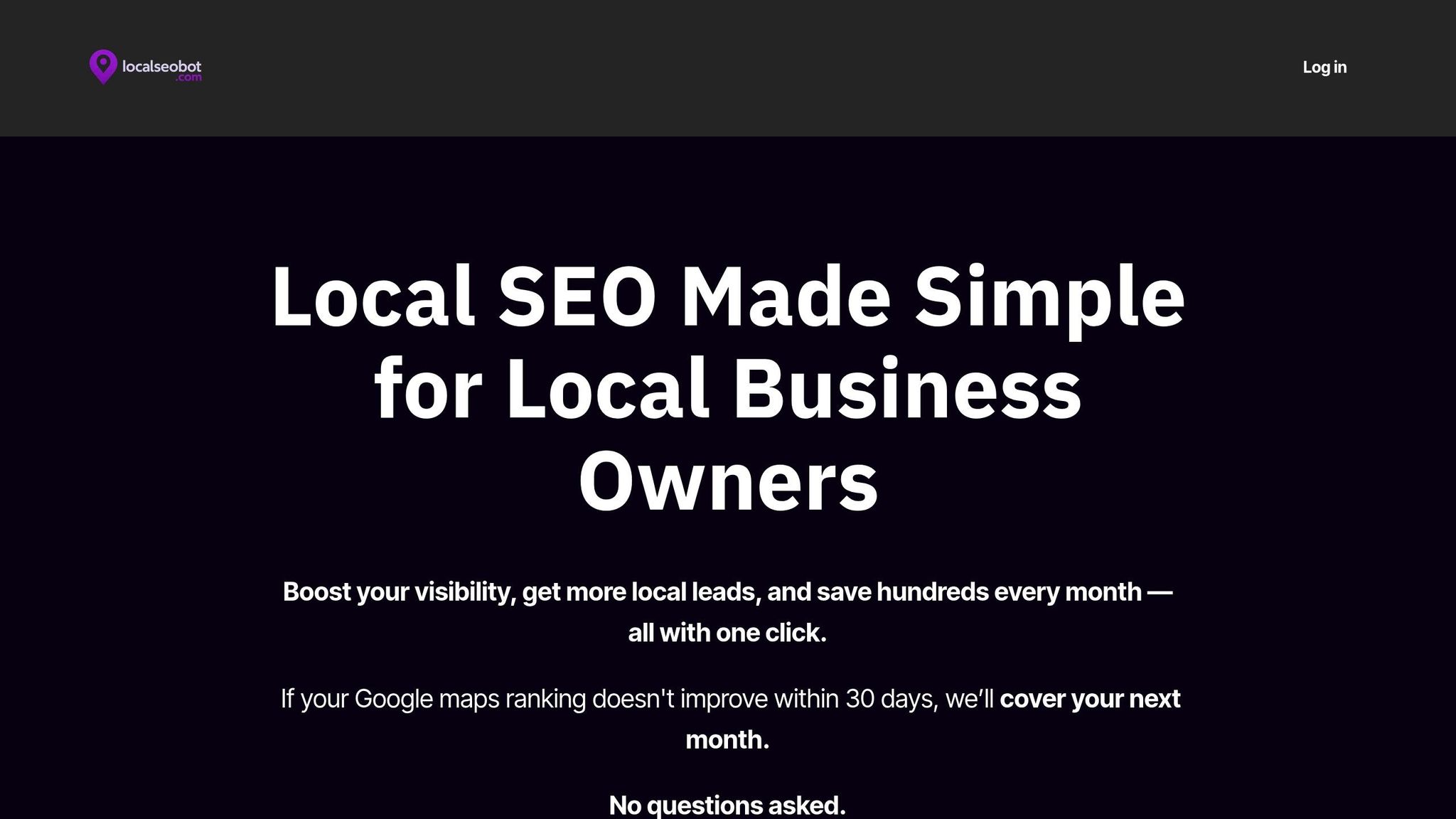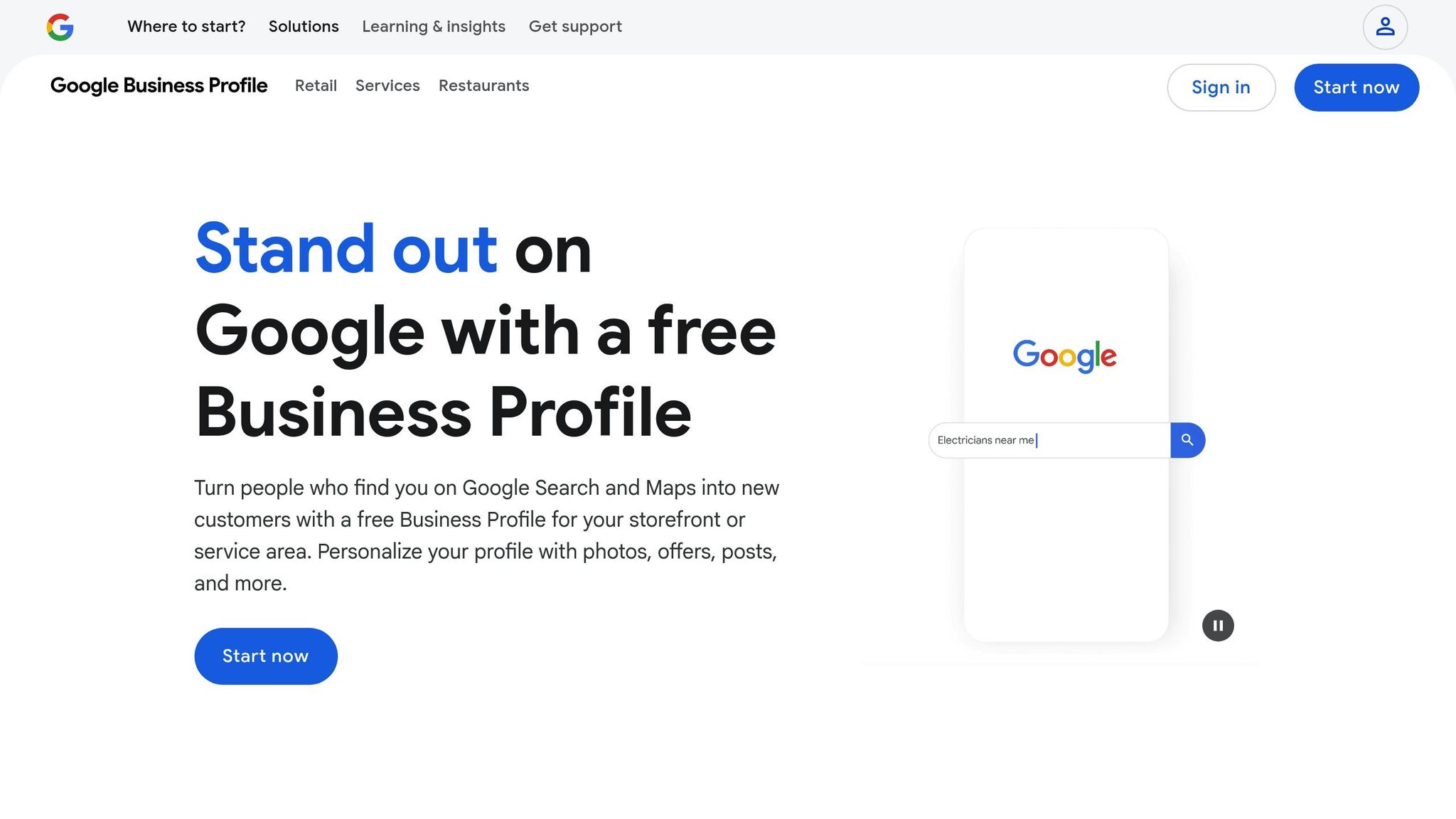Local citations are more important than ever for small businesses in 2025. Google’s latest algorithm updates focus heavily on real-time data accuracy, consistency, and trust signals from your business's online presence. If your business information - like name, address, and phone number (NAP) - is outdated or inconsistent across platforms, your local search rankings can take a hit.
Here’s what you need to know right away:
- Google’s AI now cross-checks your business details across directories in real time.
- Inaccurate or mismatched information can lead to penalties in search rankings.
- Tools like Local SEO Bot simplify citation management, helping businesses keep their details updated automatically.
To succeed, focus on:
- NAP Consistency: Ensure your business name, address, and phone number match perfectly across all platforms.
- High-Value Directories: Prioritize authoritative sources like Google Business Profile, Yelp, and industry-specific sites.
- Localized Content: Add location-specific details and community engagement updates to your listings.
- Automation: Use tools to monitor and update citations efficiently, saving time and avoiding errors.
If you’re not managing your citations carefully, you risk losing visibility in local searches. The key takeaway? Stay accurate, consistent, and proactive with your online business details.
How We Build Citations for Local SEO (Step-by-Step)
Google's 2025 Local Search Algorithm Changes
Google has introduced updates to its local search algorithm that place a stronger emphasis on the accuracy, timeliness, and relevance of business citations. Now more than ever, having consistent and precise information - like phone numbers, addresses, and hours of operation - across all platforms is critical. Even small inconsistencies can negatively impact local rankings, as Google’s real-time verification system scrutinizes these details closely.
To stay competitive, businesses need to prioritize tools that automate citation management. These updates also highlight the growing importance of E-E-A-T criteria, review signals, and AI-driven personalization in shaping local search outcomes.
E-E-A-T and Local Relevance Requirements
Google’s E-E-A-T framework - Experience, Expertise, Authoritativeness, and Trustworthiness - continues to play a pivotal role in local search rankings. Beyond just listing basic contact details, businesses are encouraged to demonstrate their local presence and engagement. This could mean updating seasonal hours, sharing community involvement, or reflecting changes in services to show an active and reliable presence.
Consistency across well-known directories, like the Better Business Bureau or local Chamber of Commerce websites, can significantly boost a business’s authority. Regularly maintaining accurate details, such as operating hours and service offerings, not only builds trust but also signals that the business is actively managed. These efforts align closely with the optimization strategies discussed later in the article.
Real-Time Data Accuracy and Review Signals
Google’s real-time verification now goes beyond just checking your business name, address, and phone number (NAP). It also evaluates other details, like service descriptions and operating hours. Any mismatch between your Google Business Profile and other directories can lead to penalties.
Reviews are now more closely tied to citation data, playing a critical role in validating your business information. Positive reviews that confirm your listed details can enhance credibility, while discrepancies - such as reviews mentioning outdated hours - can harm it. This integration underscores the importance of managing citations comprehensively to maintain strong local search performance.
AI-Powered Local Search Personalization
AI is reshaping local search by tailoring results based on user behavior, search history, and location. To take advantage of this, businesses should ensure their citations include specific, localized details. For example, mentioning neighborhood names, nearby landmarks, or clearly defined service areas can help attract more targeted searches.
Imagine a restaurant highlighting its downtown location and kid-friendly amenities - it’s more likely to appear in searches for family dining options nearby. Similarly, updating seasonal hours or promotions can help capture attention during peak times.
These updates make it clear: keeping your business information accurate, detailed, and up-to-date is essential to meet the evolving demands of local search. The next section will dive deeper into strategies for effective citation building to help businesses stay ahead.
How to Build and Optimize Local Citations in 2025
Building effective local citations in 2025 requires a sharp focus on accuracy, authority, and local relevance. With Google's real-time data validation becoming more sophisticated, businesses must prioritize consistency and credibility to stay competitive. Here’s how to get it right.
Maintaining NAP Consistency Across All Platforms
Your Name, Address, and Phone number (NAP) must match perfectly across every platform. Even small inconsistencies, like a misplaced comma or a different phone format, can lead to penalties.
Start by creating a master NAP document - a single, definitive reference for your business information. This document should include your exact business name, full address, and primary phone number. Use it to ensure consistency when adding or updating citations.
- Address formatting: Stick to one format (e.g., "123 Main Street, Suite 200") and use it everywhere, down to the punctuation.
- Phone numbers: Choose one format, such as (555) 123-4567 or 555-123-4567, and avoid mixing styles.
- Business names: If your business operates under multiple names or nicknames, select one official name for all listings. Use "Also Known As" fields, where available, to list any variations.
Keeping these details uniform across platforms helps Google verify your business more easily, boosting your local SEO performance.
Choosing High-Value Citation Sources
Once your NAP is consistent, focus on quality citation sources that can significantly impact your local SEO. Not all directories are created equal, so prioritize platforms that offer the most authority and relevance.
- Google Business Profile: This is the most critical citation for your local SEO. Make sure your profile is fully completed with accurate hours, service descriptions, photos, and regular updates. A well-maintained Google Business Profile can have a bigger impact than dozens of smaller listings.
- Industry-specific directories: Choose platforms tailored to your field. For example, restaurants benefit more from OpenTable, Yelp, or TripAdvisor, while healthcare providers should focus on Healthgrades or WebMD.
- Local organizations: Listings with your local Chamber of Commerce or the Better Business Bureau carry weight because these groups verify information before publishing. They also add credibility and trustworthiness.
- Government and municipal websites: Directories like business license databases or city and county registries are highly authoritative. While you may not be able to submit directly, ensuring your information is accurate in these databases is crucial.
Rather than scattering efforts across hundreds of directories, aim to build 15-20 high-quality citations. A smaller number of authoritative listings will outperform a large collection of inconsistent or low-value ones.
Adding Local Content to Citation Listings
In 2025, optimizing citations goes beyond just accurate business details. Google’s AI now rewards businesses that include locally-relevant content in their listings.
- Be specific about your location: Instead of simply listing "Chicago, IL", include details like "Lincoln Park neighborhood, near DePaul University" or "Downtown Chicago, two blocks from Millennium Park." These specifics align with localized search queries and improve your visibility.
- Highlight community involvement: Mention local sponsorships, events, or partnerships. For example, if you sponsor a neighborhood sports team or collaborate with nearby businesses, include those details. This shows genuine local engagement.
- Seasonal updates: Keep your listings fresh by adding seasonal or event-based information. A landscaping company might highlight snow removal services in winter, while a café could promote outdoor seating in summer.
- Local keywords: Naturally integrate keywords that reflect your area and services. For example, a Portland coffee shop might mention "locally roasted beans" or "Pearl District café." Avoid overloading your descriptions with keywords, but use terms that local customers are likely to search for.
Regularly auditing your citations ensures they remain accurate, relevant, and aligned with your local SEO goals.
sbb-itb-0e6533f
Citation Management Automation for Small Businesses
Managing citations manually can be a real headache, especially with Google's 2025 focus on consistent NAP (Name, Address, Phone) data across multiple platforms. Automation tools can save time and effort, keeping your business information accurate and up-to-date across all listings. Let's dive into how Local SEO Bot simplifies citation management and takes the hassle out of the process.
Local SEO Bot Citation Building Features

Local SEO Bot makes citation building a breeze with its one-click optimization feature. Instead of spending hours researching which directories are worth your time, the platform automates submissions to trusted and impactful sources. This not only saves time but also boosts your local search rankings by ensuring your business is listed in the right places.
The system doesn’t stop there - it actively monitors your citations for any inconsistencies in your business information. If discrepancies pop up, it flags them so you can address the issues quickly, preventing any negative impact on your online visibility.
Google Business Profile and Review Management Automation

Keeping your Google Business Profile current is vital for maintaining strong local search signals. With Local SEO Bot, you can automate profile management, ensuring your listing always reflects the latest business details, photos, and updates - without needing to log in daily.
But the automation doesn’t end with citations. Local SEO Bot also helps manage your Google Business Profile and reviews. Automated tools handle review responses, ensuring they are timely and professional, and notify you of new feedback. Plus, it can schedule regular posts to keep your profile fresh with updates, promotions, or service announcements.
To top it off, performance tracking tools provide detailed insights, showing which citations are driving traffic and contributing to your local SEO success. Armed with this data, you can fine-tune your strategy and focus on what works best.
Tracking Citation Performance and Long-Term Maintenance
Keeping a close eye on your citation performance and maintaining accuracy over time can make all the difference in staying visible to local customers. With Google's 2025 algorithm updates focusing heavily on real-time data accuracy, staying proactive is no longer optional - it’s essential.
Key Metrics for Citation Success
Several metrics can help you evaluate how well your citations are performing:
- Local rankings: Your position in local search results is one of the clearest indicators of citation health. If rankings for important local search terms start to slip, it could point to inconsistencies in your citations.
- Citation accuracy: Consistency in your business's name, address, and phone number (NAP) across platforms is crucial. Even small discrepancies - like writing "Street" on one site and "St." on another - can confuse search algorithms.
- Review activity: Google now factors in not only the volume of reviews but also how actively businesses respond to them. A steady flow of reviews and timely responses reflects positively on your citation performance.
- Click-through rates (CTR): Tracking CTRs from citation listings can reveal which directories are driving meaningful traffic to your site. Focus your energy on these high-performing directories rather than trying to be present everywhere.
These metrics provide a solid foundation for conducting regular citation audits.
Regular Citation Audits and Updates
Routine citation audits are vital to ensure your business details remain consistent and accurate. Small errors, if left unchecked, can snowball into larger issues that hurt your search rankings.
- Update outdated information: Make sure your business details reflect any changes, especially during seasonal shifts or after introducing new services. Incorrect information can lead to missed opportunities with potential customers.
- Deep-dive into secondary sources: While routine checks cover the basics, occasionally perform a more thorough audit of secondary citation platforms. This is a good chance to confirm your business categories are correct and that any recent updates are reflected everywhere.
- Prioritize primary directories: Focus on keeping your most important citations - like Google Business Profile and Yelp - up to date first. These have the most significant impact on your local visibility.
Planning ahead for algorithm changes is just as important as maintaining current accuracy.
Preparing for Future Algorithm Updates
Algorithm updates can shake up local search rankings, but with the right preparation, you can stay ahead of the curve.
- Monitor visibility trends: Use tools to track local search performance. If you notice sudden drops across multiple listings, it could signal a broader algorithm update rather than isolated citation issues.
- Diversify citation sources: Building a presence across multiple high-quality directories can help protect your visibility. If one platform changes its policies or loses influence, you’ll have other sources to rely on.
- Keep backups: Maintain an up-to-date record of your core business details. If errors occur, you’ll be able to quickly restore consistency.
- Stay informed: Keep an eye on new trends like voice search and AI-driven local recommendations. A clean, well-maintained citation profile will position your business to adapt as these technologies continue to evolve.
Treat citation management as an ongoing process rather than a one-time task. Regular monitoring, timely updates, and a forward-thinking approach will ensure your business stays competitive in an ever-changing digital landscape.
Conclusion: Local Citation Success in 2025 and Beyond
The world of local citations has shifted significantly with Google’s 2025 algorithm updates, making accuracy, consistency, and regular upkeep more important than ever for standing out in local search results.
Here’s what’s new: Google’s AI now evaluates citations through multiple lenses. Real-time data accuracy and E-E-A-T signals (Experience, Expertise, Authoritativeness, and Trustworthiness) have become key factors in determining a business’s local authority. Plus, the activity tied to your citations - like reviews - directly impacts how credible your business appears online.
With these changes, trying to manage citations manually has become an uphill battle. Keeping track of listings across numerous platforms eats up time that could be better spent growing your business or focusing on customers. That’s where automation steps in as a game-changer.
Local SEO Bot simplifies this process by offering tools like citation building, Google Business Profile management, and automated review responses - all for just $49/month. It’s a cost-effective way for small businesses to handle professional-level citation management without hiring extra staff or juggling multiple platforms. This automated approach ensures your citation strategy stays strong and adaptable.
The businesses thriving in local search today are the ones that understand the technical demands of modern citations and leverage automation to stay ahead. Prioritize quality over sheer volume, consistency over scattered efforts, and make ongoing maintenance a regular part of your strategy.
FAQs
What changes in Google's 2025 algorithm update affect local search rankings, and how can businesses stay visible?
Google's 2025 algorithm update is all about real connections, local precision, and accurate business details. To keep your business in the spotlight, here’s what you need to focus on:
- Actively encourage positive customer reviews and respond to them - this builds trust and engagement.
- Ensure your NAP (Name, Address, Phone) information is consistent across all platforms - no exceptions.
- Fine-tune your site for mobile and voice search - these are becoming non-negotiable.
- Incorporate location-specific keywords naturally into your content to capture local traffic.
On top of that, delivering a personalized customer experience and staying active on platforms like Google Business Profile can give you a serious edge in local search rankings.
How does the E-E-A-T framework influence local citation strategies, and how can businesses apply it effectively?
The E-E-A-T framework - Experience, Expertise, Authoritativeness, and Trustworthiness - is a cornerstone for creating high-quality local citations that meet Google's expectations. It ensures your business appears dependable and credible to both users and search engines.
To make the most of E-E-A-T, start by showcasing real-world experience. This can be done by providing accurate business details and sharing customer testimonials. Demonstrate expertise through well-maintained profiles, consistent citations, and any relevant industry credentials. Establish authority by earning positive reviews and actively engaging with your audience online. Lastly, build trustworthiness by using secure websites and keeping all your business information accurate and consistent across every platform.
Why is automating local citations essential for small businesses, and how does it address the need for accurate, real-time data?
Managing local citations can be a game-changer for small businesses, especially when automation steps in to handle the heavy lifting. It streamlines the task of keeping business details consistent across numerous online directories, saving valuable time and reducing the risk of mistakes. Errors like mismatched addresses or outdated phone numbers can hurt your local search rankings, so minimizing manual input is a smart move.
Why does this matter? Search engines rely on accurate, consistent information to trust your business. Automated tools ensure your details are updated in real-time across all platforms. This not only improves your online visibility but also makes it easier for local customers to find and trust your business. It’s a practical way to meet the rising demand for precision in a fast-paced digital world.


